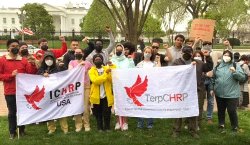Trade deals putting corporates before people and environment
MEDIA RELEASE
October 10, 2019
Community groups representing millions say trade deals with Indonesia, Hong Kong and Peru put corporate rights before people and environment and urge Labor and cross-bench to oppose them
“National organisations representing unions, church, aid and development, environment and public health constituencies have written to Labor and cross-bench MPs asking them to oppose implementing legislation for trade deals with Peru, Indonesia and Hong Kong,” AFTINET Convener Dr Patricia Ranald said today
The organisations include the Australian Council of Trade Unions, the Australian Catholic Social Justice Council, ActionAid Australia, the Australian Conservation Foundation, Friends of the Earth Australia and the Public Health Association of Australia.
“The Report of the government-dominated joint Standing Committee on Treaties has predictably recommended in favour of the Indonesia and Hong Kong deals. The government intends to bundle their implementing legislation together with the Peru FTA and rush them through Parliament in one Bill. This gives even less opportunity than usual to scrutinise and debate the merits of each of these three agreements before voting on the legislation,” said Dr Ranald.
“The letters note that the deals include controversial rights for foreign investors to sue governments for millions over domestic laws, known as ISDS, including over environmental and other public interest laws. This is not only contrary to the policies of Labor, Greens and Centre Alliance but also runs counter to international trends away from ISDS,” said Dr Ranald.
“The Australian government recently agreed to exclude ISDS from the Regional Comprehensive Economic Partnership involving China, India, Japan, South Korea, New Zealand, Indonesia and nine other ASEAN countries. ISDS is excluded from current negotiations for the Australia-EU FTA, and the US and Canada have recently excluded it from the revised version of the North American Free Trade Agreement,” said Dr Ranald
The Indonesia deal also proposes to expand the numbers of temporary workers who are tied to one employer and experience wage theft and other forms of exploitation, and none of the deals have enforceable commitments by governments to implement labour rights and environmental standards,“ said Dr Ranald.
“Recent polling shows 75-80% community opposition to the inclusion of ISDS and increased numbers of vulnerable temporary workers in trade agreements. The letter calls on Labor, Greens and Centre alliance to implement their policies and oppose these deals,” said Dr Ranald.
Copies of the letters are attached and below.
Contact Dr Patricia Ranald 0419 695 841
Copies of Letters
To ALP MPs and Senators as addressed
Dear
Please implement the Labor platform and oppose the implementing legislation for trade agreements with Peru, Indonesia and Hong Kong.
As
you may know, AFTINET is a network of community
organisations that has advocated for fair trade through
community education and submissions to government for the
last 20 years. We support greater transparency and
accountability in trade negotiations and trade agreements
that are consistent with human rights, labour rights, public
health, gender equality and environmental sustainability,
and that do not restrict the right of governments to
regulate in the public interest.
This is why we welcomed
Labor’s
2018 Platform that pledged to oppose, in government and
opposition, trade agreements that include foreign investor
rights to sue governments (ISDS), increased numbers of vulnerable
temporary workers, and trade in services provisions that
encourage privatisation and inhibit governments’ right to
regulate in the public interest.
The Platform also
recognised that for trade agreements to benefit the whole
community they must include enforceable
internationally-recognised labour rights, be consistent with
sustainable development and higher environmental standards
and be subject to Independent National Interest Assessments
that include comprehensive social, economic and regional
impacts.
We welcomed Labor’s 2018 Platform because
it’s good for people and the environment. With three trade
agreements set to come to a vote in Parliament, we are now
asking that you implement these policies. These agreements
contain provisions which are contrary to the Labour
platform:
Truncated Parliamentary
process
We understand that the government, after
an unusually short JSCOT combined inquiry into the
Indonesia-Australia Comprehensive Economic Partnership
(IACEPA) and the Australia-Hong Kong Free Trade Agreement
(AHKFTA) is intending to bundle together the implementing
legislation for both agreements with the legislation for the
Peru-Australia free Trade Agreement (PAFTA).
This shows a
complete disregard for democratic process because it means
that Parliament will have even less opportunity than usual
to scrutinise and debate the merits of each of these three
agreements before voting on the legislation. We also note
that there has been no Independent economic or other
assessments of the negotiated treaty texts.
We note that
the PAFTA legislation was postponed after two JSCOT
inquiries, the second of which was initiated by Labor. In
the second
report, Labor members commented critically that PAFTA
unnecessarily duplicated the TPP-11, of which Peru is a
member, contained ISDS provisions and has not been subject
to an independent cost-benefit
analysis.
Inclusion of ISDS
All three
agreements include ISDS provisions. This not only
contradicts Labor policy, but it also runs counter to
shifting international trends away from ISDS. The Australian
government recently agreed to exclude
ISDS from the Regional Comprehensive Economic
Partnership involving China, India, Japan, South Korea, New
Zealand, Indonesia and nine other ASEAN countries. ISDS is
excluded
from current negotiations for the Australia-EU FTA, and the
US and Canada have recently excluded
it from the revised version of NAFTA. ISDS is no longer
acceptable to many of our major trading partners Labor
should ensure it is not acceptable in Australia as
well.
We also note that the IACEPA has ISDS provisions
which have some exclusions for health regulation, (although
these do not exclude cases against labour and environmental
regulation) and some improved procedural processes. But
these exclusions are nullified by the fact that the
government, contrary to usual practice, has failed to
terminate the 1993 Indonesia-Australia bilateral investment
treaty which has no exclusions at all. This means that
corporations will simply use the older
treaty.
Inclusion of trade in services and
temporary worker provisions
All three agreements
contain trade in services provisions that contradict
Labor’s Platform and encourage privatisation and inhibit
governments’ right to regulate and re-regulate public
services in the public interest. The Indonesia and Peru FTAs
also expand the number of temporary workers vulnerable to
exploitation.
No enforceable labour rights and
environmental standards
Neither the Hong Kong
nor Indonesian agreements contain any chapters on
enforceable labour rights or environmental standards. The
Peru agreement chapters on labour and environment are
aspirational and not in any way legally enforceable through
state-to state mechanisms in the same way as other chapters
in the agreement.
Below is a table that compares the
three agreements with the key clauses in the Labor
Platform.
| Labor Platform | Peru FTA | IACEPA | Hong Kong FTA |
| No ISDS (clause 109.2) | Includes ISDS | Includes ISDS and fails to cancel old ISDS agreement | Includes ISDS |
| No increase in numbers of temporary workers (clauses 109.1 and 126-7) | Includes increased numbers of temporary workers | Includes increased numbers of temporary workers | |
| No restrictions on regulation of public services (clause 129) | Includes restrictions on regulation of public services | Includes restrictions on regulation of public services | Includes restrictions on regulation of public services |
| Enforceable labour rights (clause 109.10) | Aspirational, not enforceable | None | None |
| Environmental standards (clause 141) | Aspirational, not enforceable | None | none |
| Independent assessment of costs and benefits (clause 115) | No | No | No |
This table
demonstrates that these agreements are not consistent with
Labor’s platform in key areas of policy.
We are asking
you to implement Labor policy and vote against the
implementing legislation for these agreements. This letter
is endorsed by the national bodies representing, unions,
church, aid and development, public health and environment
organisations listed below.
Dr Patricia
Ranald
Convenor, Australian Fair Trade and Investment
Network
Attachment 1. Endorsing
organisations
1. Australian Fair Trade
and Investment Network
2. Australian Council of
Trade Unions
3. ActionAid
Australia
4. Australian Catholic Social Justice
Council
5. Australian Conservation
Foundation
6. Friends of the Earth
Australia
7. Public Health Association of
Australia.
To Greens MPs and Senators as
addressed
Dear
Please implement your policies and vote against implementing legislation for Peru, Indonesia and Hong Kong trade agreements
As you
know, AFTINET is a network of community organisations that
has advocated for fair trade through community education and
submissions to government for the last 20 years. We support
greater transparency and accountability in trade
negotiations and trade agreements that are consistent with
human rights, labour rights, public health, gender equality
and environmental sustainability, and that do not restrict
the right of governments to regulate in the public
interest.
We are writing to ask you to vote against the
implementing legislation for the Peru, Indonesia and Hong
Kong trade agreements. We welcomed the Greens dissenting
reports from the JSCOT inquiries for these agreements and we
thank you for your ongoing support for a trade system that
puts people and the environment ahead of corporate profit.
These agreements include provisions that contradict Greens
trade policies, including:
Truncated
parliamentary process
There have been
significant shortfalls in the negotiation and parliamentary
processes for these agreements. We understand that the
government, after an unusually short JSCOT combined inquiry
into the Indonesia-Australia Comprehensive Economic
Partnership (IACEPA) and the Australia-Hong Kong Free Trade
Agreement (AHKFTA) is intending to bundle together the
implementing legislation for both agreements with the
legislation for the Peru-Australia free Trade Agreement
(PAFTA).
This shows a complete disregard for democratic
process because it means that Parliament will have even less
opportunity than usual to scrutinise and debate the merits
of each of these three agreements before voting on the
legislation. We also note that there has been no Independent
economic or other assessments of the negotiated treaty
texts.
Inclusion of ISDS
All three
agreements include ISDS provisions. This not only
contradicts Greens policy, but it also runs counter to
shifting international trends away from ISDS. The Australian
government recently agreed to exclude
ISDS from the Regional Comprehensive Economic
Partnership involving China, India, Japan, South Korea, New
Zealand, Indonesia and nine other ASEAN countries. ISDS is
excluded
from current negotiations for the Australia-EU FTA, and the
US and Canada have recently excluded
it from the revised version of NAFTA. ISDS is no longer
acceptable to many of our major trading partners. The Greens
should ensure it is not acceptable in Australia as
well.
We also note that the IACEPA has ISDS provisions
which have some exclusions for health regulation, (although
these do not exclude cases against labour and environmental
regulation) and some improved procedural processes. But
these exclusions are nullified by the fact that the
government, contrary to usual practice, has failed to
terminate the 1993 Indonesia-Australia bilateral investment
treaty which has no exclusions at all. This means that
corporations will simply use the older
treaty.
Inclusion of trade in services and
temporary worker provisions
All three agreements
contain trade in services provisions that contradict Greens
policy by encouraging privatisation and inhibiting
governments’ right to regulate and re-regulate public
services in the public interest. The Indonesia and Peru FTAs
also expand the number of temporary workers vulnerable to
exploitation.
No enforceable labour rights and
environmental standards
Neither the Hong Kong
nor Indonesian agreements contain any chapters on
enforceable labour rights or environmental standards. The
Peru agreement chapters on labour and environment are
aspirational and not in any way legally enforceable through
state-to state mechanisms in the same way as other chapters
in the agreement.
We ask that you continue to stand up
for a trade system that supports people and the environment
by voting against the implementing legislation for the Peru,
Indonesia and Hong Kong trade agreements. This letter is
endorsed by the national bodies representing, unions,
church, aid and development, public health and environment
organisations listed below.
Dr Patricia
Ranald
Convenor, Australian Fair Trade and Investment
Network
Endorsing organisations
.Australian Fair Trade and
Investment Network
Australian Council of Trade
Unions
ActionAid Australia
Australian Catholic Social
Justice Council
Australian Conservation
Foundation
Friends of the Earth Australia
Public
Health Association of
Australia.
To Centre Alliance MPs as addressed
Dear
Please implement your policy and vote against implementing legislation for Peru, Indonesia and Hong Kong trade agreements
As you know, AFTINET is a network of community
organisations that has advocated for fair trade through
community education and submissions to government for the
last 20 years. We support greater transparency and
accountability in trade negotiations and trade agreements
that are consistent with human rights, labour rights, public
health, gender equality and environmental sustainability,
and that do not restrict the right of governments to
regulate in the public interest.
We are writing to ask
you to vote against the implementing legislation for the
Peru, Indonesia and Hong Kong trade agreements. We thank you
for your ongoing support for fair trade agreements that have
benefits across the Australian community and for your
opposition to some of the most damaging trade provisions,
including include foreign investor rights to sue governments
(ISDS), increased numbers of vulnerable
temporary workers, and trade in services provisions that
encourage privatisation and inhibit governments’ right to
regulate in the public interest.
There have been
significant shortcomings in the negotiation and
parliamentary processes for the Peru, Indonesia and Hong
Kong trade agreements and the agreements include many
provisions that contradict Centre Alliance
policies, including:
Truncated Parliamentary
process
We understand that the government, after
an unusually short JSCOT combined inquiry into the
Indonesia-Australia Comprehensive Economic Partnership
(IACEPA) and the Australia-Hong Kong Free Trade Agreement
(AHKFTA) is intending to bundle together the implementing
legislation for both agreements with the legislation for the
Peru-Australia free Trade Agreement (PAFTA).
This shows a
complete disregard for democratic process because it means
that Parliament will have even less opportunity than usual
to scrutinise and debate the merits of each of these three
agreements before voting on the legislation. We also note
that there has been no Independent economic or other
assessments of the negotiated treaty
texts.
Inclusion of ISDS
All three
agreements include ISDS provisions. This not only
contradicts Centre Alliance policy, but it also runs counter
to shifting international trends away from ISDS. The
Australian government recently agreed to exclude
ISDS from the Regional Comprehensive Economic
Partnership involving China, India, Japan, South Korea, New
Zealand, Indonesia and nine other ASEAN countries. ISDS is
excluded
from current negotiations for the Australia-EU FTA, and the
US and Canada have recently excluded
it from the revised version of NAFTA. ISDS is no longer
acceptable to many of our major trading partners. The Centre
Alliance should ensure it is not acceptable in Australia as
well.
We also note that the IACEPA has ISDS provisions
which have some exclusions for health regulation, (although
these do not exclude cases against labour and environmental
regulation) and some improved procedural processes. But
these exclusions are nullified by the fact that the
government, contrary to usual practice, has failed to
terminate the 1993 Indonesia-Australia bilateral investment
treaty which has no exclusions at all. This means that
corporations will simply use the older
treaty.
Inclusion of trade in services and
temporary worker provisions
All three agreements
contain trade in services provisions that contradict Centre
Alliance policy by encouraging privatisation and inhibiting
governments’ right to regulate and re-regulate public
services in the public interest. The Indonesia and Peru FTAs
also expand the number of temporary workers vulnerable to
exploitation.
No enforceable labour rights and
environmental standards
Neither the Hong Kong
nor Indonesian agreements contain any chapters on
enforceable labour rights or environmental standards. The
Peru agreement chapters on labour and environment are
aspirational and not in any way legally enforceable through
state-to state mechanisms in the same way as other chapters
in the agreement.
We ask that you continue to stand up
for a trade system that supports people and the environment
by voting against the implementing legislation for the Peru,
Indonesia and Hong Kong trade agreements. This letter is
endorsed by the national bodies representing, unions,
church, aid and development, public health and environment
organisations listed below.
Dr Patricia
Ranald
Convenor, Australian Fair Trade and Investment
Network
Endorsing organisations
Australian Fair Trade and
Investment Network
Australian Council of Trade
Unions
ActionAid Australia
Australian Catholic Social
Justice Council
Australian Conservation
Foundation
Friends of the Earth Australia
Public
Health Association of
Australia.


 Carbon Market Watch: Going For Green - Is The Paris Olympics Winning The Race Against The Climate Clock?
Carbon Market Watch: Going For Green - Is The Paris Olympics Winning The Race Against The Climate Clock? New Zealand Defence Force: NZDF Working With Pacific Neighbours To Support Solomon Islands Election
New Zealand Defence Force: NZDF Working With Pacific Neighbours To Support Solomon Islands Election UN News: Ceasefire The Only Way To End Killing And Injuring Of Children In Gaza
UN News: Ceasefire The Only Way To End Killing And Injuring Of Children In Gaza ICHRP: US-Japan-Philippines Trilateral Summit Makes The Philippines A Battlefield For US-China Conflict
ICHRP: US-Japan-Philippines Trilateral Summit Makes The Philippines A Battlefield For US-China Conflict East West Center: Environmental Journalist Alexander Kaufman Receives East-West Center’s Inaugural Melvin M.S. Goo Writing Fellowship
East West Center: Environmental Journalist Alexander Kaufman Receives East-West Center’s Inaugural Melvin M.S. Goo Writing Fellowship Compassion in World Farming: Octopus Farm Must Be Stopped, Say Campaigners
Compassion in World Farming: Octopus Farm Must Be Stopped, Say Campaigners